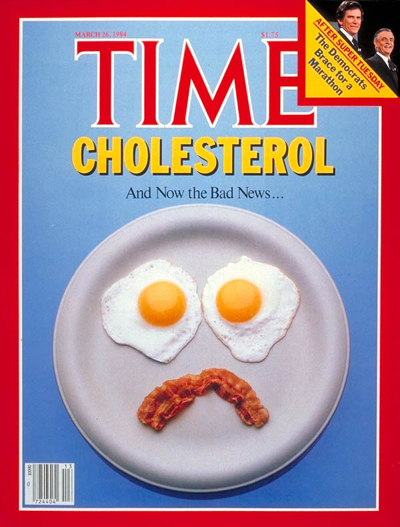It looks like you're using an Ad Blocker.
Please white-list or disable AboveTopSecret.com in your ad-blocking tool.
Thank you.
Some features of ATS will be disabled while you continue to use an ad-blocker.
share:
The food guide pyramid that is being pushed upon us is based on junk science. For some reason fats have been demonized, to the detriment of Americans
health. For 40 years, people have been warned against eating fatty foods containing high cholesterol, such as butter, eggs, red meat, shellfish and
liver, because of supposed links to the substance in our blood.
Eat a balanced diet and get some exercise. Educate yourself with regards to nutritional science, don't trust the government to tell you whats healthy and what isn't healthy.
I do not believe the federal government should dictate almost every aspect of what kids eat at schools. Local communities, with the input of parents, should make these decisions
www.scientificamerican.com...


Eat a balanced diet and get some exercise. Educate yourself with regards to nutritional science, don't trust the government to tell you whats healthy and what isn't healthy.
I do not believe the federal government should dictate almost every aspect of what kids eat at schools. Local communities, with the input of parents, should make these decisions
Raw data from a 40-year-old study raises new questions about fats
Ramsden and his colleagues discovered what had been hidden for nearly half a century: records on 9,423 study participants, ages 20 to 97, all living in state mental hospitals or a nursing home. It was the largest experiment of its kind.
It was also one of the most rigorous. Participants were randomly assigned either to the group eating the then-standard diet, which was high in animal fats and margarines, or to a group in which vegetable oil and corn oil margarine replaced about half of those saturated fats. Such a randomized controlled trial is considered less likely to produce misleading results than observational studies, in which volunteers eat whatever they choose.
Analyzing the reams of old records, Ramsden and his team found, in line with the “diet-heart hypothesis,” that substituting vegetable oils lowered total blood cholesterol levels, by an average of 14 percent.
But that lowered cholesterol did not help people live longer. Instead, the lower cholesterol fell, the higher the risk of dying: 22 percent higher for every 30-point fall. Nor did the corn-oil group have less atherosclerosis or fewer heart attacks.
Critics of the demonization of saturated fat have long pointed out that key findings from landmark studies were never published. One, the Seven Countries Study, originally included many more nations. But in only seven did populations consuming lots of saturated fats have high levels of heart disease, prompting recent accusations of cherry-picking data.
That 1970 study was hugely influential, however, leading to congressional hearings and guidelines advising against eating saturated fat and arguing for the benefits of polyunsaturated fats.
www.scientificamerican.com...


In 5 days my friend, you certainly can pop out a few threads..... Most of quality i might add
As far as this goes, i believe you can eat what you want, just gotta keep movin. As we get older, we (most) do not move around as much as when we were kids, Gotta Burn!!!
That's why it's called a calorie isn't it ?
BTW, where on earth did they get a pic of Mobama like that LOL
As far as this goes, i believe you can eat what you want, just gotta keep movin. As we get older, we (most) do not move around as much as when we were kids, Gotta Burn!!!
That's why it's called a calorie isn't it ?
BTW, where on earth did they get a pic of Mobama like that LOL
edit on 1/1/2018 by scubagravy because: (no reason given)
The problem with this and other studies regarding Cholesterol, is that compared to the past is how much we are putting inside ourselves today. No
Cholesterol is bad but limit how much you are eating and the problem is not Cholesterol but having too much in such a short time.
edit on 1-1-2018 by bearclan because: (no reason given)
edit on 1-1-2018 by bearclan because: (no reason given)
a reply to: scubagravy
yep the old granny out raking in the garden lives to be 90 everytime
I knew this about fats....and our beloved eggs, why you can live on em.....i gotta quit listening to tv.....huh!!
that's fats and good bad cholesteral....now what about salt intake and......mmmm....bacon?....he....he
yep the old granny out raking in the garden lives to be 90 everytime
I knew this about fats....and our beloved eggs, why you can live on em.....i gotta quit listening to tv.....huh!!
that's fats and good bad cholesteral....now what about salt intake and......mmmm....bacon?....he....he
Oh wait, place a picture of Michelle Obama (bad) in your post and automatic stars and flags. Nevermind facts.
edit on 1-1-2018 by
bearclan because: (no reason given)
What kind of salt?
originally posted by: GBP/JPY
a reply to: scubagravy
that's fats and good bad cholesteral....now what about salt intake and......mmmm....bacon?....he....he
Did you know that the majority of the population is deficient in Potassium?
Nobody I know eats 7-10 cups of veggies to get their 4700mg of Potassium a day.
Have a coconut water instead of a soda, it's a great source of Potassium, 890 mg/480 ml
Next time you pick up salt for the shaker, grab some half and half salt it's half Potassium Chloride.
Consult a doctor if you have kidney or liver issues.
edit on 1-1-2018 by EvidenceNibbler because: (no reason given)
originally posted by: EvidenceNibbler
What kind of salt?
originally posted by: GBP/JPY
a reply to: scubagravy
that's fats and good bad cholesteral....now what about salt intake and......mmmm....bacon?....he....he
Did you know that the majority of the population is deficient in Potassium?
Next time you pick up salt for the shaker, grab this, it's half Potassium Chloride.
Back it up with legit studies.
Potassium: Health benefits and recommended intake
edit on 1-1-2018 by bearclan
because: (no reason given)
originally posted by: bearclan
originally posted by: EvidenceNibbler
What kind of salt?
originally posted by: GBP/JPY
a reply to: scubagravy
that's fats and good bad cholesteral....now what about salt intake and......mmmm....bacon?....he....he
Did you know that the majority of the population is deficient in Potassium?
Next time you pick up salt for the shaker, grab this, it's half Potassium Chloride.
Back it up with legit studies.
All outta google over there?
Let me help you out.
Potassium is identified in the 2010 Dietary Guidelines for Americans as a nutrient to be increased in the diet (1), and the Institute of Medicine (IOM) recommendation for Adequate Intake of potassium is 4700 mg per day (2).
In 2009-2010, the average dietary potassium intake of the U.S. population aged two years and older was 2640 mg per day. Intake of males overall was higher than females. although gender differences between those 2-5 years and 6-11 years were not significant. As shown in Figure 1, potassium intake of males increased through adulthood, with a decrease for those aged 60+ years. Increases in intakes of females were substantially smaller compared to males. These intakes have remained relatively unchanged since the mid-1990s, and are comparable to intakes observed in the 1994-1998 Continuing Survey of Food Intakes by Individuals (data not shown).
www.ars.usda.gov...
edit on 1-1-2018 by EvidenceNibbler because: (no reason given)
(post by bearclan removed for political trolling and baiting)
a reply to: EvidenceNibbler
Sodium Intake of Special Populations in the Healthy Aging in Neighborhoods of Diversity Across the Life Span (HANDLS) Study
Now a study that represents this
Sodium Intake of Special Populations in the Healthy Aging in Neighborhoods of Diversity Across the Life Span (HANDLS) Study
The sodium intake of participants of the Healthy Aging in Neighborhoods of Diversity across the Life Span study who were in three of the special population groups identified by the Dietary Guidelines for Americans, 2010 (those with hypertension, African Americans, and those ≥51 years) was analyzed to determine if they met sodium recommendations
Now a study that represents this
like you claimed.
the majority of the population is deficient in Potassium?
edit on 1-1-2018 by bearclan because: (no reason given)
originally posted by: vonclod
a reply to: EvidenceNibbler
What do they say about Magnesium? I think we don't get enough.
I would agree with the statement you have made, and evidence backs that up.
Current magnesium intakes in the US population are below recommended levels (400-420 mg/day for men and 310-320 mg/day for women). Dietary sources rich in magnesium include green leafy vegetables, unrefined grains, legumes, beans, and nuts.

I supplement with a Cal/Magt thats in a citrate form, which means your body can absorb it.
It's the same as what a hospital will give their patients that are deficient.
Bearclan is running through the thread trying desperately to prove me wrong, and I encourage you to do your own research, I am but some guy on the internet, always consult a doctor before supplementing anything is the best advice.
edit on 1-1-2018 by EvidenceNibbler because: (no reason
given)
a reply to: EvidenceNibbler
Food pattern modeling shows that the 2010 Dietary Guidelines for sodium and potassium cannot be met simultaneously
Food pattern modeling shows that the 2010 Dietary Guidelines for sodium and potassium cannot be met simultaneously
The 2010 US Dietary Guidelines recommended limiting intake of sodium to 1500 mg/d for people older than 50 years, African Americans, and those suffering from chronic disease. The guidelines recommended that all other people consume less than 2300 mg sodium and 4700 mg of potassium per day. The theoretical feasibility of meeting the sodium and potassium guidelines while simultaneously maintaining nutritional adequacy of the diet was tested using food pattern modeling based on linear programming.
originally posted by: Chadwickus
a reply to: EvidenceNibbler
And that’s how science works.
Always changing, always evolving.
NO. That data was never published, it was buried and not allowed to see the light of day.
Instead, the Ancel Keys study was allowed to stand, a study that used data from only 7 out of 22 countries in order to push a narrative.
edit
on 1-1-2018 by EvidenceNibbler because: (no reason given)
new topics
-
Bibi’s Dilemma
Middle East Issues: 24 minutes ago -
Proof of Cleptocracy
US Political Madness: 3 hours ago -
Boy Scouts to be renamed next year
Other Current Events: 7 hours ago -
Pfizer agrees to settle over 10,000 Zantac lawsuits after cancer causing substance found in drug
Medical Issues & Conspiracies: 8 hours ago -
Judas Iscariot Slips The Hangman's Noose
Political Issues: 11 hours ago
top topics
-
Ooooh...it worked!!
Members: 16 hours ago, 20 flags -
Judas Iscariot Slips The Hangman's Noose
Political Issues: 11 hours ago, 10 flags -
A Shout-out To truthseeker45 Hoot Hoot
General Chit Chat: 13 hours ago, 4 flags -
Murder Suicide Investigation Still Active 4 months later?
Other Current Events: 12 hours ago, 4 flags -
Pfizer agrees to settle over 10,000 Zantac lawsuits after cancer causing substance found in drug
Medical Issues & Conspiracies: 8 hours ago, 4 flags -
Boy Scouts to be renamed next year
Other Current Events: 7 hours ago, 3 flags -
Proof of Cleptocracy
US Political Madness: 3 hours ago, 3 flags -
Bibi’s Dilemma
Middle East Issues: 24 minutes ago, 1 flags
active topics
-
Judas Iscariot Slips The Hangman's Noose
Political Issues • 24 • : Justoneman -
Bibi’s Dilemma
Middle East Issues • 1 • : WannabeeAuCourant -
Big Storms
Fragile Earth • 36 • : lilzazz -
Ooooh...it worked!!
Members • 17 • : JJproductions -
Judge Postpones Trump Classified Docs Trial INDEFINITELY
US Political Madness • 148 • : matafuchs -
Don’t Obstruct the Leftist Implosion
US Political Madness • 35 • : lilzazz -
Chris Cuomo, who pushed vaccine shots on CNN, admits Moderna vaccine destroyed his health
Mainstream News • 66 • : zosimov -
Boy Scouts to be renamed next year
Other Current Events • 62 • : andy06shake -
FBI confirms new leads connected to DNA evidence and cellphone data in disturbing killings of elderl
Other Current Events • 15 • : ByeByeAmericanPie -
Skinwalker Ranch and the Mystery 1.6GHz Signal
Aliens and UFOs • 156 • : Flyingclaydisk
